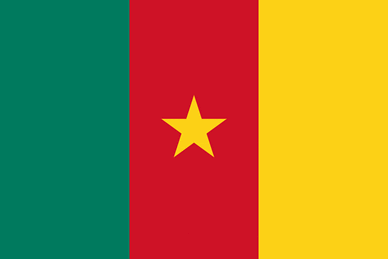We are committed to importing the finest coffee direct from a collective of small farmers in the Mountains of Cameroon West Africa.
Cameroon, on the Gulf of Guinea, is a Central African country of varied terrain and wildlife. Its inland capital, Yaoundé, and its biggest city, the seaport Douala, are transit points to ecotourism sites as well as beach resorts like Kribi – near the Chutes de la Lobé waterfalls, which plunge directly into the sea – and Limbe, where the Limbe Wildlife Centre houses rescued primates.
The country’s name is derived from Rio dos Camarões (“River of Prawns”)—the name given to the Wouri River estuary by Portuguese explorers of the 15th and 16th centuries. Camarões was also used to designate the river’s neighboring mountains. Until the late 19th century, English usage confined the term “the Cameroons” to the mountains, while the estuary was called the Cameroons River or, locally, the Bay. In 1884 the Germans extended the word Kamerun to their entire protectorate, which largely corresponded to the present state.
The country’s name is derived from Rio dos Camarões (“River of Prawns”)—the name given to the Wouri River estuary by Portuguese explorers of the 15th and 16th centuries. Camarões was also used to designate the river’s neighboring mountains. Until the late 19th century, English usage confined the term “the Cameroons” to the mountains, while the estuary was called the Cameroons River or, locally, the Bay. In 1884 the Germans extended the word Kamerun to their entire protectorate, which largely corresponded to the present state.
Due to its high altitude, rich volcanic soils and ample rainfall coffees from Cameroon are of good quality. They are full-bodied flavor with a well-rounded finish with chocolate characteristics.
Coffee production is very important for the economy of Cameroon. The crop is grown extensively in the country, with Robusta more prevalent in the coastal areas and Arabica more widespread in the western highlands. The two varieties of Arabica cultivated are Java and Jamaica of which only Java is resistant to pests such as Coffee Berry Disease and rust. In 2014, Cameroon was ranked the 31st largest producer of coffee in world.
Coffee production
Coffee is grown in seven regions of Cameroon; West, Northwest, Littoral, Southwest, South, Centre and East Region. Bamileke and Bamaoun are the high plateau areas where Arabica plantations are located. Robusta, which is a more dominant crop of the country, is grown in middle elevations in western region and also to some degree in Abang Mbang. Arabica and Robusta are partly processed within the country. The production of Cameroon’s coffee is placed under the responsibility of the Ministries of Agriculture and Rural Development (MINADER) and that of Scientific Research and Innovations (MINRESI). Under these ministries there are various projects to boost coffee production.
